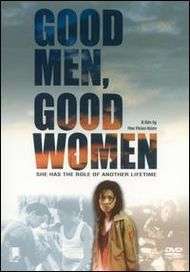Good Men, Good Women
| Good Men, Good Women | |
|---|---|
|
DVD cover | |
| Directed by | Hou Hsiao-hsien |
| Produced by | Katshuhiro Mizuno |
| Written by | T'ien-wen Chu |
| Starring |
Annie Shizuka Inoh Giong Lim Jack Kao |
| Distributed by | Fox Lorber (US DVD) |
Release dates | 1995 |
Running time | 108 minutes |
| Country | Japan/Taiwan |
| Language |
Taiwanese Mandarin Japanese Cantonese |
Good Men, Good Women (Chinese: 好男好女; pinyin: Hǎonán hǎonǚ) is a 1995 Taiwanese film directed by Hou Hsiao-Hsien, starring Annie Shizuka Inoh, Lim Giong and Jack Kao. It is the last installment in the trilogy that began with A City of Sadness (1989) and continued with The Puppetmaster (1993). Like its predecessors, it deals with the complicated issues of Taiwanese history and national identity.
Plot
The film depicts the real-life story of Chiang Bi-Yu (Annie Shizuka Inoh). In the 1940s, she and her newlywed husband, Chung Hao-Tung (Giong Lim), head to mainland China to join the anti-Japanese resistance. During the war, she is forced to give her baby for adoption. After the war they return to Taiwan, as Chung is to distribute a communist paper called "The Enlightenment". However, as the Korean War deepens, Chiang Kai-Shek's Kuomintang regime intensifies the White Terror and Chung is eventually executed.
The film consists of three intermingling storylines and scattered throughout the film are interludes of an actress (also played by Inoh) who prepares for the role of Chiang Bi-Yu, and also confronts her deceased boyfriend's past.
Cast
- Annie Shizuka Inoh - Liang Ching / Chiang Bi-Yu
- Giong Lim - Chung Hao-Tung
- Jack Kao - Ah Wel
- Hsi Hsiang - Ah Hsi
- Bo-Chow Lan - Hsiao Dao-Ying
- Li-Chin Lu - Mrs. Hslao
- Chen-Nan Tsai - Ah Nan
- Vicky Wei - Liang Ching's Sister
Awards
Good Men, Good Women won the Golden Horse Award for best director (1995), and was shown in the Cannes Film Festival.[1]
References
- ↑ "Festival de Cannes: Good Men, Good Women". festival-cannes.com. Retrieved 2009-09-03.
Silbergeld, Jerome (2004). Hitchcock With a Chinese Face: Cinematic Doubles, Oedipal Triangles, and China's Moral Voice. Seattle and London: University of Washington Press.
External links
| ||||||
